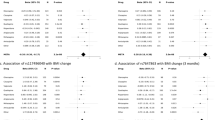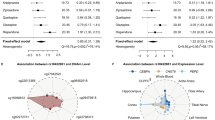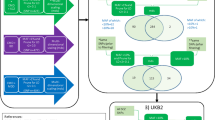Abstract
Given the polygenic nature of antipsychotic-induced weight gain (AIWG), we investigated whether polygenic risk scores (PRS) for various psychiatric and metabolic traits were associated with AIWG. We included individuals with schizophrenia (SCZ) of European ancestry from two cohorts (N = 151, age = 40.3 ± 11.8 and N = 138, age = 36.5 ± 10.8). We investigated associations of AIWG defined as binary and continuous variables with PRS calculated from genome-wide association studies of body mass index (BMI), coronary artery disease (CAD), fasting glucose, fasting insulin, high-density lipoprotein cholesterol, low-density lipoprotein cholesterol (LDL-C), triglycerides, type 1 and 2 diabetes mellitus, and SCZ, using regression models. We observed nominal associations (uncorrected p < 0.05) between PRSs for BMI, CAD, and LDL-C, type 1 diabetes, and SCZ with AIWG. While results became non-significant after correction for multiple testing, these preliminary results suggest that PRS analyses might contribute to identifying risk factors of AIWG and might help to elucidate mechanisms at play in AIWG.
This is a preview of subscription content, access via your institution
Access options
Subscribe to this journal
Receive 6 print issues and online access
$259.00 per year
only $43.17 per issue
Buy this article
- Purchase on Springer Link
- Instant access to full article PDF
Prices may be subject to local taxes which are calculated during checkout


Similar content being viewed by others
Data availability
The datasets generated and/or analyzed during the current study are available from the corresponding author on reasonable request.
References
De Hert M, Detraux J, Van Winkel R, Yu W, Correll CU. Metabolic and cardiovascular adverse effects associated with antipsychotic drugs. Nat Rev Endocrinol. 2012;8:114–26.
Ballon JS, Pajvani U, Freyberg Z, Leibel RL, Lieberman JA. Molecular pathophysiology of metabolic effects of antipsychotic medications. Trends Endocrinol Metab. 2014;25:593–600.
Dayabandara M, Hanwella R. Antipsychotic-associated weight gain: management strategies and impact on treatment adherence. Neuropsychiatr Dis Treat. 2017;13:2231–41. Available https://www.ncbi.nlm.nih.gov/pmc/articles/PMC5574691/.
Gebhardt S, Theisen FM, Haberhausen M, Heinzel-Gutenbrunner M, Wehmeier PM, Krieg J-C, et al. Body weight gain induced by atypical antipsychotics: an extension of the monocygotic twin and sib pair study. J Clin Pharm Ther. 2010;35:207–11.
Zhang JP, Lencz T, Zhang RX, Nitta M, Maayan L, John M, et al. Pharmacogenetic Associations of Antipsychotic Drug-Related Weight Gain: A Systematic Review and Meta-analysis. Schizophr Bull. 2016;42:1418–37.
Lett TAP, Wallace TJM, Chowdhury NI, Tiwari AK, Kennedy JL, Müller DJ. Pharmacogenetics of antipsychotic-induced weight gain: review and clinical implications. Mol Psychiatry. 2012;17:242–66.
Chatterjee N, Shi J, García-Closas M. Developing and evaluating polygenic risk prediction models for stratified disease prevention. Nat Rev Genet. 2016;17:392.
Martin AR, Daly MJ, Robinson EB, Hyman SE, Neale BM. Predicting Polygenic Risk of Psychiatric Disorders. Biol Psychiatry. 2018. https://doi.org/10.1016/j.biopsych.2018.12.015.
Mistry S, Harrison JR, Smith DJ, Escott-Price V, Zammit S. The use of polygenic risk scores to identify phenotypes associated with genetic risk of schizophrenia: Systematic review. Schizophr Res. 2018;197:2–8.
Cross-Disorder Group of the Psychiatric Genomics Consortium. Identification of risk loci with shared effects on five major psychiatric disorders: a genome-wide analysis. Lancet. 2013;381:1371–9.
Derks EM, Vorstman JAS, Ripke S, Kahn RS. The Schizophrenia Psychiatric Genomic Consortium, Ophoff RA. Investigation of the Genetic Association between Quantitative Measures of Psychosis and Schizophrenia: A Polygenic Risk Score Analysis. PLoS ONE. 2012;7:e37852.
Zhang J-P, Robinson D, Yu J, Gallego J, Fleischhacker WW, Kahn RS, et al. Schizophrenia Polygenic Risk Score as a Predictor of Antipsychotic Efficacy in First-Episode Psychosis. AJP. 2019;176:21–8.
Santoro ML, Ota V, de Jong S, Noto C, Spindola LM, Talarico F, et al. Polygenic risk score analyses of symptoms and treatment response in an antipsychotic-naive first episode of psychosis cohort. Transl Psychiatry. 2018;8:174.
Segura ÀG, Martínez-Pinteño A, Gassó P, Rodríguez N, Bioque M, Cuesta MJ, et al. Metabolic polygenic risk scores effect on antipsychotic-induced metabolic dysregulation: A longitudinal study in a first episode psychosis cohort. Schizophr Res. 2022;244:101–10.
Habtewold TD, Islam MA, Liemburg EJ, GROUP Investigators, Bruggeman R, Alizadeh BZ. Polygenic risk score for schizophrenia was not associated with glycemic level (HbA1c) in patients with non-affective psychosis: Genetic Risk and Outcome of Psychosis (GROUP) cohort study. J Psychosom Res. 2020;132:109968.
Choi SW, Mak TS-H, O’Reilly PF. Tutorial: a guide to performing polygenic risk score analyses. Nat Protoc. 2020. https://doi.org/10.1038/s41596-020-0353-1.
Locke AE, Kahali B, Berndt SI, Justice AE, Pers TH, Day FR, et al. Genetic studies of body mass index yield new insights for obesity biology. Nature. 2015;518:197–206.
Nikpay M, Goel A, Won H-H, Hall LM, Willenborg C, Kanoni S, et al. A comprehensive 1,000 Genomes-based genome-wide association meta-analysis of coronary artery disease. Nat Genet. 2015;47:1121–30.
Manning AK, Hivert M-F, Scott RA, Grimsby JL, Bouatia-Naji N, Chen H, et al. A genome-wide approach accounting for body mass index identifies genetic variants influencing fasting glycemic traits and insulin resistance. Nat Genet. 2012;44:659–69.
Willer CJ, Schmidt EM, Sengupta S, Peloso GM, Gustafsson S, Kanoni S, et al. Discovery and refinement of loci associated with lipid levels. Nat Genet. 2013;45:1274–83.
Onengut-Gumuscu S, Chen W-M, Burren O, Cooper NJ, Quinlan AR, Mychaleckyj JC, et al. Fine mapping of type 1 diabetes susceptibility loci and evidence for colocalization of causal variants with lymphoid gene enhancers. Nat Genet. 2015;47:381–6.
Morris AP, Voight BF, Teslovich TM, Ferreira T, Segrè AV, Steinthorsdottir V, et al. Large-scale association analysis provides insights into the genetic architecture and pathophysiology of type 2 diabetes. Nat Genet. 2012;44:981–90.
Trubetskoy V, Pardiñas AF, Qi T, Panagiotaropoulou G, Awasthi S, Bigdeli TB, et al. Mapping genomic loci implicates genes and synaptic biology in schizophrenia. Nature. 2022;604:502–8.
Huang LO, Rauch A, Mazzaferro E, Preuss M, Carobbio S, Bayrak CS, et al. Genome-wide discovery of genetic loci that uncouple excess adiposity from its comorbidities. Nat Metab. 2021;3:228–43.
Stroup TS, McEvoy JP, Swartz MS, Byerly MJ, Glick ID, Canive JM, et al. The National Institute of Mental Health Clinical Antipsychotic Trials of Intervention Effectiveness (CATIE) project: schizophrenia trial design and protocol development. Schizophr Bull. 2003;29:15–31.
Brandl EJ, Tiwari AK, Zai CC, Nurmi EL, Chowdhury NI, Arenovich T, et al. Genome-wide association study on antipsychotic-induced weight gain in the CATIE sample. Pharmacogenom J. 2016;16:352–6.
Brandl EJ, Frydrychowicz C, Tiwari AK, Lett TAP, Kitzrow W, Büttner S, et al. Progress in Neuro-Psychopharmacology & Biological Psychiatry Association study of polymorphisms in leptin and leptin receptor genes with antipsychotic-induced body weight gain. Prog Neuropsychopharmacol Biol Psychiatry. 2012;38:134–41.
Tiwari AK, Rodgers JB, Sicard M, Zai CC, Likhodi O, Freeman N, et al. Association study of polymorphisms in cholecystokinin gene and its receptors with antipsychotic induced weight gain in schizophrenia patients. Prog Neuropsychopharmacol Biol Psychiatry. 2010;34:1484–90.
Tiwari AK, Zai CC, Likhodi O, Lisker A, Singh D, Souza RP, et al. A common polymorphism in the cannabinoid receptor 1 (CNR1) gene is associated with antipsychotic-induced weight gain in Schizophrenia. Neuropsychopharmacology. 2010;35:1315–24.
Maciukiewicz M, Tiwari AK, Zai CC, Gorbovskaya I, Laughlin CP, Nurmi EL, et al. Genome-wide association study on antipsychotic-induced weight gain in Europeans and African-Americans. Schizophr Res. 2019;212:204–12.
De Hert M, Yu W, Detraux J, Sweers K, van Winkel R, Correll CU. Body weight and metabolic adverse effects of asenapine, iloperidone, lurasidone and paliperidone in the treatment of schizophrenia and bipolar disorder. CNS Drugs. 2012;26:733–59.
Cinar, Viechtbauer. The poolr package for combining independent and dependent p values. J Stat Softw. http://statistik-jstat.uibk.ac.at/article/view/v101i01.
Nyholt DR. A simple correction for multiple testing for single-nucleotide polymorphisms in linkage disequilibrium with each other. Am J Hum Genet. 2004;74:765–9.
Ikeda M, Tanaka S, Saito T, Ozaki N, Kamatani Y, Iwata N. Re-evaluating classical body type theories: genetic correlation between psychiatric disorders and body mass index. Psychol Med. 2018;48:1745–8.
Veeneman RR, Vermeulen JM, Abdellaoui A, Sanderson E, Wootton RE, Tadros R, et al. Exploring the Relationship Between Schizophrenia and Cardiovascular Disease: A Genetic Correlation and Multivariable Mendelian Randomization Study. Schizophr Bull. 2022;48:463–73.
Tylee DS, Lee YK, Wendt FR, Pathak GA, Levey DF, De Angelis F, et al. An Atlas of Genetic Correlations and Genetically Informed Associations Linking Psychiatric and Immune-Related Phenotypes. JAMA Psychiatry. 2022. https://doi.org/10.1001/jamapsychiatry.2022.0914.
Fonseka TM, Müller DJ, Kennedy SH. Inflammatory Cytokines and Antipsychotic-Induced Weight Gain: Review and Clinical Implications. Mol Neuropsychiatry. 2016;2:1–14.
Schizophrenia Working Group of the Psychiatric Genomics Consortium. Biological insights from 108 schizophrenia-associated genetic loci. Nature. 2014;511:421–7.
Acknowledgements
AKT is supported by the Tanenbaum Centre for Pharmacogenetics and McLaughlin Centre Accelerator Grant (2019–2020), Canada.
Author information
Authors and Affiliations
Contributions
KY and DJM contributed to and have approved the design and the protocol of the study. KY did the literature search. KY, VM, MM, SE conducted the statistical analyses. KY wrote the first draft of the paper. All authors interpreted the data, wrote the report, and approved the final version of the paper.
Corresponding author
Ethics declarations
Competing interests
KY has received paper fees from Sumitomo Dainippon Pharma, Brain & Behavior Research Foundation: Young Investigator Grant 2021, and Discovery Fund at CAMH within the past 3 years. AKT is a co-inventor on a patent for antipsychotic-induced weight gain (U.S. patent no. 10,662,475). EJB has received speaker fees from Medice. JAL is a member of the advisory boards of Boehringer Ingelheim and EdenRoc Sciences. HYM has received grant support from the National Institute of Mental Health, ACADIA, Eli Lilly, Neurocrine, Sepracor, Dainippon Sumitomo, and Janssen. JLK is a member of the Scientific Advisory Board of Myriad Neuroscience(unpaid) and holds several patents relating to pharmacogenetic tests for psychiatric medications. The other authors have nothing to disclose.
Additional information
Publisher’s note Springer Nature remains neutral with regard to jurisdictional claims in published maps and institutional affiliations.
Rights and permissions
Springer Nature or its licensor (e.g. a society or other partner) holds exclusive rights to this article under a publishing agreement with the author(s) or other rightsholder(s); author self-archiving of the accepted manuscript version of this article is solely governed by the terms of such publishing agreement and applicable law.
About this article
Cite this article
Yoshida, K., Marshe, V.S., Elsheikh, S.S.M. et al. Polygenic risk scores analyses of psychiatric and metabolic traits with antipsychotic-induced weight gain in schizophrenia: an exploratory study. Pharmacogenomics J 23, 119–126 (2023). https://doi.org/10.1038/s41397-023-00305-y
Received:
Revised:
Accepted:
Published:
Issue Date:
DOI: https://doi.org/10.1038/s41397-023-00305-y



